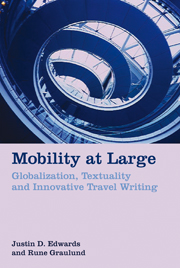Book contents
- Frontmatter
- Contents
- Acknowledgements
- Introduction: Travel Revisited
- 1 Travelling with the Ondaatje Bros.
- 2 Amitav Ghosh and Caryl Phillips: Global Travel, Then and Now
- 3 Unhomely Travels; or, the Haunts of Daphne Marlatt and W. G. Sebald
- 4 The World, My City: Home Grounds and Global Cities
- 5 Travel Histories – From Kuala Lumpur to Istanbul and Beyond
- Postscript: Still Mobile
- Bibliography
- Index
Postscript: Still Mobile
- Frontmatter
- Contents
- Acknowledgements
- Introduction: Travel Revisited
- 1 Travelling with the Ondaatje Bros.
- 2 Amitav Ghosh and Caryl Phillips: Global Travel, Then and Now
- 3 Unhomely Travels; or, the Haunts of Daphne Marlatt and W. G. Sebald
- 4 The World, My City: Home Grounds and Global Cities
- 5 Travel Histories – From Kuala Lumpur to Istanbul and Beyond
- Postscript: Still Mobile
- Bibliography
- Index
Summary
Critical studies of contemporary travel writing have a tendency to end on a note of impending doom, declaring the imminent demise of travel as well as travel writing. Some of these dire predictions assert that travel writing is dead and buried, lost forever to tourism, travel's distant and less interesting cousin (Fussell). Others diagnose travel as terminally ill, but not quite dead. This is either because we might still discover alterity somewhere deep in the Amazon, or because travel continues to take on new and extreme forms (Huggan). Still others declare that the genre is alive and well, but only due to a nostalgic longing for empires that have been lost. Such claims see travel writing as a genre that is doomed to repeat politically problematic images of colonization, racism and exoticism (Lisle).
The purpose of this book is to suggest something quite different. We have argued that globalization and (post)modernity have not lead to the death of travel. On the contrary, the increase in mobility and communication through jet travel, mass tourism and the internet have engendered new kinds of travel and, by extension, new ways of articulating and understanding travel. The issue is not where we travel, but how. Thus, we have tried to show how travel writing can -in its innovative forms – be employed as a means for enabling rather than stifling voices that actively challenge the politics of Empire.
- Type
- Chapter
- Information
- Mobility at LargeGlobalization, Textuality and Innovative Travel Writing, pp. 198 - 202Publisher: Liverpool University PressPrint publication year: 2012



